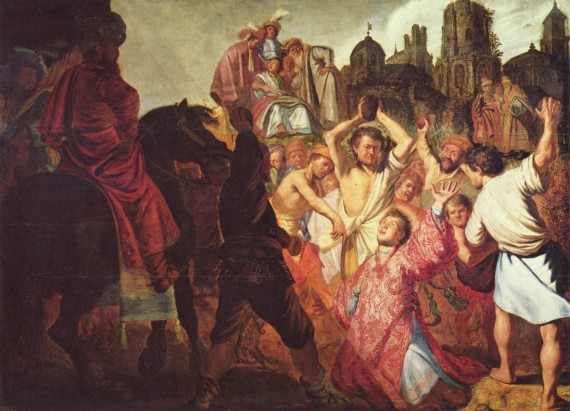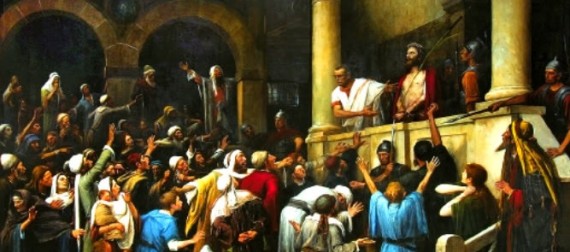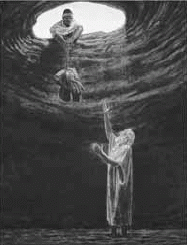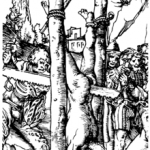
In Acts 7, Stephen presents his defense for why he is a follower of Jesus. At one point in his speech, he says this:
Which of the prophets did your fathers not persecute? (Acts 7:52)
In other words, “Name me one prophet that our ancestors did not persecute, despise, and reject.”
What is Stephen saying? He is saying the same thing that Jesus said: “Prophets are never accepted in their hometown” (Luke 4:24). Yes, and maybe not in their home country, or even their home time era.
And “never accepted” is an understatement. Many of the prophets were hunted down, arrested, starved, tortured, and killed.
But let’s do a little thought experiment about prophets
Put yourself back at the time of Stephen. Imagine that you are standing there, listening to his speech.
As you imagine yourself there, on that day, as the mass presses upon him murderous rage, where do you picture yourself standing? What are you thinking? What are you doing?
Would you have been sticking up for what Stephen taught?
Or would you have been among those who picked up stones to kill him?
In the image below, where do you place yourself?

Yeah, me too. I imagine myself among those who stand up for Stephen.
But notice in Acts 7, that the only one standing up for Stephen on this day was Jesus Christ (Acts 7:56). Everybody else present had been caught up on the contagion of violence and picked up stones to kill him.
Hmm….
Well, maybe all his supporters were too scared. Or weren’t allowed in to the trial.
But if we had been there, we would have been on the side of the condemned! Right?
But would we have?
If you had been present at the stoning of Stephen, would you have protected him or stoned him?
Let’s try a simpler (or harder) scenario.
Imagine yourself living in Jerusalem during the days of Jesus’ arrest and crucifixion.
Where do you imagine yourself standing?
Do you imagine yourself standing at the foot of the cross, weeping for how they have crucified your Lord?
Or do you imagine yourself standing in the mob, chanting “Crucify Him! Crucify Him! Crucify Him!”
In the image below, where do you place yourself?

Again, I’m with you. I imagine myself as being among those who had forsaken all to follow Him.
I imagine myself as being among those who stood by Jesus’ side no matter what. I imagine myself being among His closest followers.
… Except …
Where were all of his closest followers during the trial of Jesus?
The only disciple nearby was Peter, and he was busy denying and cursing Jesus.
Well then, we definitely would have been there with Jesus when he was crucified. Right?
Umm … Maybe not.
According to the Gospel accounts, it appears that only John showed up at the crucifixion, along with the mother of Jesus and several other women (John 19:25-27).
But you and I? We definitely would have been there, right?
Let’s be honest … probably not.
If we consider the thousands of people who just a few days before were wanting to crown Jesus as king (Matthew 21), the fact that only a few of these showed up at the cross does not provide good odds that we ourselves would have been among those few.
Even if we narrow it down to the 72 disciples that Jesus sent out to minister in the countryside, the fact that less than 5 people stood by Jesus as the cross gives us a less than a 7% chance that you or I would have been there. Since most of these were women, if you are a man, your odds are less than 1.5%.
Even among the closest twelve followers of Jesus, one betrayed Him, one denied Him, nine ran away and hid, and only one showed up at the foot of the cross.
So if you had been present at the crucifixion of Jesus, would you have wept for His death or cried out for His blood?
What does this mean?
We who claim to follow God do not have a good track record of recognizing God’s messengers, and even when we do recognize them, we have an even worse track record of standing by them when trouble comes.
Statistically, traditionally, historically, and Scripturally, rather than listen to the messengers of God, we are far more likely to reject, despise, slander, condemn, rebuke, persecute, and even kill those whom God has sent to speak His truth to us.
“No! Not us!” we say. “If we had lived in the days of Jesus, we would have recognized Him and stood by His side.”

Yes, and that’s exactly what the people in the days of Jesus said about the prophets who came before Jesus … right before they turned around and killed Him (Matthew 23:30).
Do we honestly think that you and I would have done any better at recognizing and listening to Jesus (or any of the prophets) than did the vast majority of people in those days?
Most of those people likely knew the Bible better than we do. Most of them probably prayed more in one day than we do in a month. Most of them had vast portions of Scripture memorized. Most of them attended Torah study three or four times a week, and on Saturday they spent most of the day at the Synagogue (the Jewish church) in Scripture study and prayer.
Yet when prophets came, including the Messiah Himself, they didn’t recognized or heed any of these prophets, but instead, chased them out of town, made false accusations against them, had them arrested, tortured, starved, stoned, and crucified.
And we think we would have been different?
Honesty demands that we probably would have been among the crowd calling for the death of a the prophet.
Why am I saying this?
Here’s why:
If the people in the days of the prophets failed to recognize them as prophets, but instead condemned, accused, judged, criticized, and killed them, and if the people in the days of Jesus failed to recognize Him as the Messiah, but instead condemned, accused, judged, criticized, and killed him, then maybe … just maybe … the way to recognize a messenger of God to us is to look at who we Christians like to condemn, accuse, judge, criticize, and kill … and then consider that maybe … just maybe … these people are God’s messengers to us.
If we look at Scripture and history, we see that the reason God’s messengers get condemned and criticized and killed is because they never go with the religious status quo, but instead, call on the religious people to repent and change their ways, and abandon the foolish and empty chase after religious rituals and regulations.
This is why it typically was not the non-religious, secular “sinners” who reject and condemn the prophets, but the religious people who do so.
So who do you condemn? Who do you judge? Who do you label as a “sinner”? Who is it that seems to be attacking your way of reading Scripture and your understanding of how God “set things up”? Who is it that you accuse of undermining your traditions, of sacrificing your sacred cows?
Might it be possible that these people are really God’s messengers to you, that they might be God’s prophet?
Might it be possible that your enemy is your prophet and God wants you to listen to those you would rather ignore, and love those you would rather hate?
Have you persecuted a prophet today?
Don’t be too quick to answer “No.”




Thanks Jeremy.
“We probably would have been among the crowd calling for the death of a the prophet.”
This statement is nevertheless theoretical. I believe the proportion of true believers in Jesus, His life, death, and resurrection have always been far smaller than those living a form of Christianity without the substance, i.e., the Holy Spirit. Stephen was clearly possessed by the Spirit — Stephen was in the light, as were a few others.
I would also ask — What is the state of your fear? (1 John 4:18).
Can you, as a disciple, with a clear conscience come close to relating to 1 Corinthians 13:4-8, where the greatest gift, love, is profiled? Perfect love casts out all fear.
Conviction is what keeps Christians focused on Christ, and fearless — “O, ye of little faith.”
The devil plays on the rudiments of fear of pain, death, and faithlessness. Just as Stephen would have probably been gripped with fear, if the Spirit were not in him; the same applies to all who profess Christ. The children in the Middle East today, who refuse to deny Christ in the face of certain death, have that perfect love, which is greater than even faith, 1 Corinthians 13:13.
Since the whole world lies in the power of the evil one (1 John 5:19) — saturated in darkness; the only way out is the Spirit of God, 1 John 1:5-7.
So many things have to be in place to conquer fear, which comes as a side effect of the process of taking up our crosses and conforming to the image of Christ. Taking up our cross begins with loving our neighbors as ourselves; and God.
The Lord tells us love even our enemies; yet, not being in the Light, 1 John 1:5, makes that impossible.
So, yes, you are probably correct in your assessment, Jeremy — people need experience to know who they are in Christ, to begin to judge how they are likely to respond in times of trial.
Great Post Jeremy very very True indeed there is a lot of people who after they seen this post would promby not be able to look at themselves the same way after really thinking about this that’s for sure.
Please…non-religious sinners skin me alive for even MENTIONING that copulation with someone of the same gender is wrong!
It seems common that we have trouble recognizing prophets when they do not agree with us. We think others to be heretics or something of the sort, and ourselves to be prophets. If we feel “persecuted”, that proves we’re prophets, doesn’t it?
Many years ago I worked in a large office. A woman sat near me. After I had worked near her for about a year, I heard from a member of her church that she told the church folks that she was “persecuted” at work because she was a Christian. At work she told us that her church “persecuted” her. She seemed to think that proved she was some sort of “prophet”.
The lady in question drove her car to work, a car filled with many years worth of fast-food wrappers. The headliner of her car was ripped in numerous places and strips of headliner hung down inside the car and were clearly visible. The lady kept to herself at work, and barely spoke to co-workers. According to her fellow church member, she behaved in a similar fashion at church. She was not accepted by most people either at work or church.
Does “persecution”, real or imagined, prove one is a prophet? Maybe it only proves that others consider us odd. Nevertheless, as followers of Jesus, even if we should consider those who think they are persecuted as odd, even if we disagree with them, should we not love them? Is that not what we should do, rather than condemn them, judge them and label them as “sinners”? After all, we may be wrong. Perhaps they are indeed prophets and we are the ones whose vision is clouded.
On the subject of sin one day I pondered. Of my life’s failures, the things I had squandered. I prayed that I be not ever guilty of murder and violence. And was reminded that yes I to had stood at the cross in silence.
Church people called for Kim Clements death a few years ago despite evidence of a prophetic ministry. He didn’t even stand up to religious people either. He had a different prophetic focus often political. Anyone who stands up to church people, church leadership, church tradition, or extremism tends to be beaten down quick, fast and in a hurry. I’ve notice some prophetic types have started to steer away from churches because of the persecution. :'(